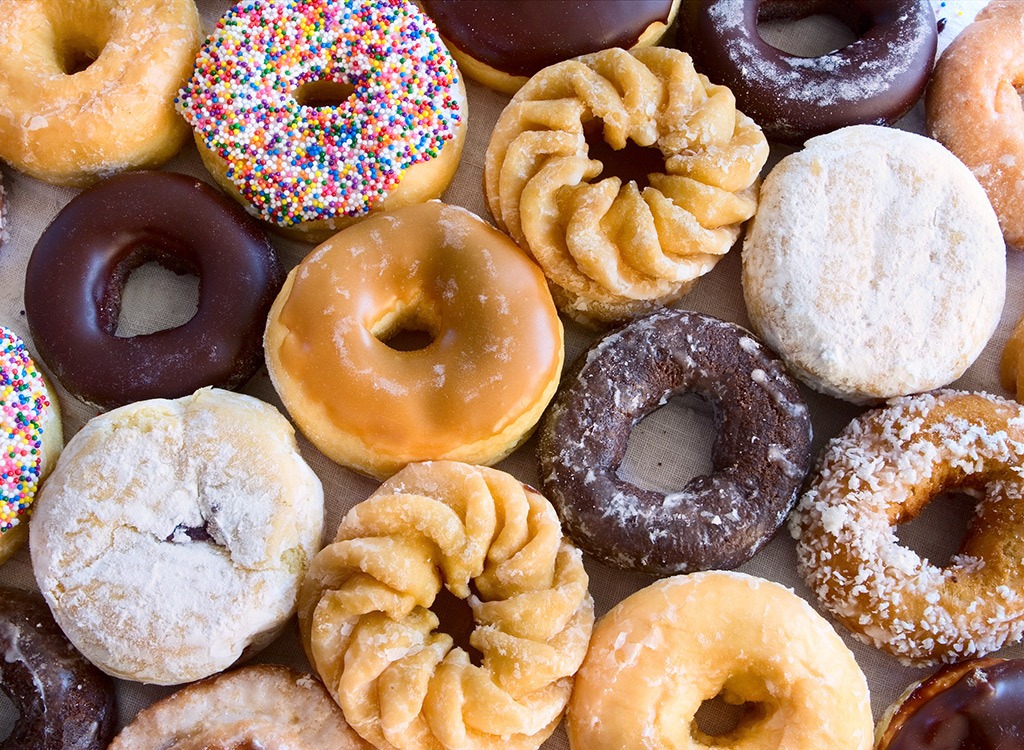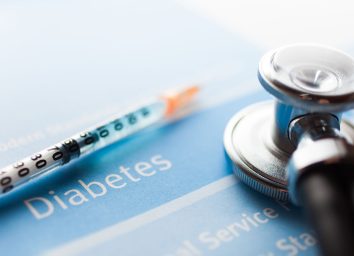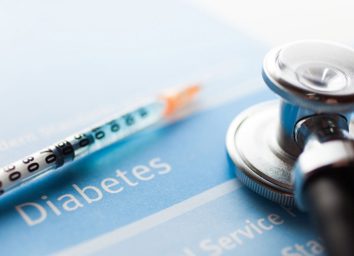Does Sugar Cause Diabetes? An Expert Debunks the Myth Once and for All

If you've ever been anywhere near a dessert table, you've probably heard a joke about diabetes. Whether it's someone avoiding an overly frosted cake or trying to assuage their guilt for eating a piece of candy, there's a pervasive idea that if you eat too many sweets, you'll develop Type 2 diabetes. But in reality, there are many factors that contribute to the disease—and you're not going to develop it just because you decided to eat a cupcake or a scoop of ice cream.
In addition to the fact that added sugar is only one piece of the puzzle, the idea that sugar alone is responsible for diabetes diagnoses can contribute to fatphobia and biased thinking. Telling people with diabetes that they "did this to themselves" isn't helpful, and it oversimplifies the many factors that are associated with the condition.
To get to the bottom of what really causes diabetes, we asked Billie Karel, MPH, RD, LDN, CDE with Lutz, Alexander & Associates Nutrition Therapy in Raleigh, NC, to shed some light on some common misconceptions around diabetes.
What really causes Type 2 diabetes?
"Type 2 diabetes is a complex disease that looks a little different for each person who has it," says Karel. "It arises from a somewhat different combination of factors for each individual, it can behave a little differently, and it will take somewhat different combinations of medications and lifestyle modifications to manage."
According to the American Diabetes Association, some of the factors that can contribute to your risk of developing diabetes include:
- having a relative with diabetes
- not maintaining regular physical activity
- having high blood pressure
- having polycystic ovary syndrome (PCOS)
"Genetics contribute a huge amount to someone's risk for Type 2 diabetes, but the exact amount probably varies between individuals," Karel says.
Other factors Karel lists as being associated with a higher risk for Type 2 diabetes include:
- age
- stress level
- trauma and ACEs (adverse childhood experiences)
- exposure to certain environmental pollutants
- history of weight cycling (i.e. yo-yo dieting)
- low physical activity level
- poor diet quality
How does added sugar factor in?
Insulin resistance can lead to elevated blood sugar levels, which could, in turn, lead to a Type 2 diagnosis. It's not just added sugars that are to blame, though—the type of carbs you eat can affect blood sugar, too.
"People may think that added sugar (or any sugar) causes Type 2 diabetes, and therefore that people who have Type 2 diabetes must have caused the condition themselves by eating too much sugar. It's just not that simple," says Karel. "While a diet high in added sugars may increase the risk of developing Type 2 diabetes, many people who consume added sugars regularly never do, and others who eat comparatively little sugar do still develop Type 2 diabetes."
What about blood sugar levels?
"Insulin resistance is the key mechanism that leads to blood sugar elevation and development of Type 2 diabetes. It means that the body's muscles and other working tissues get less sensitive (or more resistant) to the insulin that the pancreas makes," Karel says. "For a while, the pancreas keeps up by making extra insulin, so the blood sugar remains normal (though other things can start to change—for many, increasing insulin can cause elevated blood lipids and weight gain even before it affects blood sugar). When someone's pancreas isn't able to keep up anymore, their blood sugar will begin to rise, and that's what triggers a diagnosis with Type 2 diabetes."
And in terms of blood sugar, the added sugars found in candy or desserts aren't the only thing to worry about. As the American Diabetes Association explains, refined carbs, such as white bread, can affect blood sugar levels, too. If you've been diagnosed with Type 2 diabetes or prediabetes, make sure your diet is rich in foods with a low glycemic index, like whole grains, rather than white bread.
What other factors impact Type 2 diabetes risk?
Blaming someone with Type 2 diabetes for their dietary habits isn't helpful for treating the condition, and it's also not the whole story. "Added sugar is only one relatively small piece of the puzzle of what makes up a 'high-quality diet,' and poor dietary quality is only one of many risk factors for Type 2 diabetes," says Karel. She lists factors like food insecurity and stress as examples of reasons people might undereat (and later overeat), which can affect blood sugar levels, too.
Karel also says that socioeconomic factors play a part in diabetes risk factors, and health more generally. "Even while having enough food, people may not be able to get a wide enough variety to support balanced nutrition if they don't have transportation to the nearest grocery store selling perishable foods like fruit, vegetables, meats, and dairy products, or if that grocery store doesn't sell many of those foods at prices they can afford," she says. "This is especially challenging for folks in rural areas or those who don't have reliable transportation to get themselves to the store and then get their groceries back home."
There's no one factor that determines someone's risk for Type 2 diabetes, and it's definitely not as simple as "eating too much sugar." Of course, eating a balanced diet is an essential part of managing diabetes and other health conditions, but when it comes to diagnosing Type 2 diabetes, there are plenty of other factors at play.








